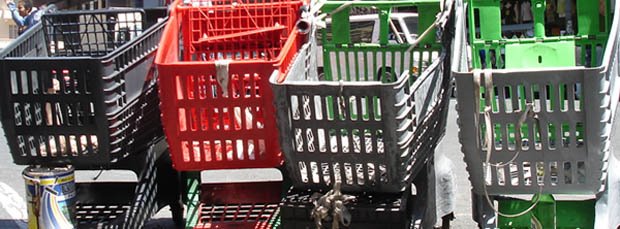Theft of supermarket trolleys is a highly organised business. The trolleys are supplied by gangs made up of Zimbabwean youth, who utilise hired trucks and vans to transport stolen trolleys from shopping centers to the downtown area where they are sold on the streets.
The trolley pushers are not directly responsible for the theft of trolleys. However, everyone is aware of the pick up points for stolen trolleys in the area. During quiet periods, stolen trolleys are sold for as little as R50, whilst trolleys can sell for as much as R200 during busy periods.
The response from supermarket chain stores has been to setup a special task force for recovering stolen trolleys off the streets. Weekly raids ensure that all the visible trolleys in the area are confiscated. Subsequently, the trolley pushers have devised a system, whereby trolleys are locked to immovable property on the sidewalk. During raids trolleys are also moved off the streets and are parked into the basement spaces of high rise buildings.
Trolley pushers report that it is becoming increasingly difficult to operate with stolen trolleys on the streets, as the police and supermarket chain stores are clamping down on the activity. Most of the interviewed trolley pushers don’t like the hassle associated with pushing stolen supermarket trolleys and are desperate for a viable legal alternative.
Friday, February 20, 2009
Thursday, February 19, 2009
The Spatial Organisation of Trolley Pushers in Joubert Park
On the morning of the 3rd of February 2009, 106 trolley pushers were counted in the Joubert Park area. Our study shows that 50% of trolley pushers were of Zimbabwean origin, 40% of Mozambican origin, whilst South African trolley pushers made up only 10% of the total number of trolley pushers.
Trolley pusher groups occupy almost every corner of Joubert Park. The groups prefer waiting at known taxi stops, where they are likely to find customers requiring baggage assistance. There are approximately 20 trolley pusher groups operating within a 10 block radius in Joubert Park. Group sizes vary from as little as 2 members to as many as 20 members per group. The groups are formed through informal social agreements where routes of operation are agreed upon. The barriers of access are very low with only R50 required to buy a stolen supermarket trolley. Theoretically, anybody can become a trolley pusher, however the activity is exclusively male dominated.
Trolley Pushers who operate independently, without any affiliation to a group are known as ‘spinners’. ‘Spinners’ tour the city in search of customers and are often accused of stealing people’s luggage. They also cause conflicts with trolley groups as there is severe competition for business. Conflicts amongst larger groups are more common, as every additional member adds to the competition for customers.
Trolley pusher groups occupy almost every corner of Joubert Park. The groups prefer waiting at known taxi stops, where they are likely to find customers requiring baggage assistance. There are approximately 20 trolley pusher groups operating within a 10 block radius in Joubert Park. Group sizes vary from as little as 2 members to as many as 20 members per group. The groups are formed through informal social agreements where routes of operation are agreed upon. The barriers of access are very low with only R50 required to buy a stolen supermarket trolley. Theoretically, anybody can become a trolley pusher, however the activity is exclusively male dominated.
Trolley Pushers who operate independently, without any affiliation to a group are known as ‘spinners’. ‘Spinners’ tour the city in search of customers and are often accused of stealing people’s luggage. They also cause conflicts with trolley groups as there is severe competition for business. Conflicts amongst larger groups are more common, as every additional member adds to the competition for customers.
Wednesday, February 11, 2009
Latest Trolley Designs
Checkout our latest designs for our research and cartage trolley. In total four custom built trolleys are being developed as part of an active experiment on Johannesburg roads. The trolleys are being designed to ride on, with large pneumatic wheels to ensure all road capability. The design also boasts a unique fold away research station, for conducting surveys and for the storing of information leaflets.
Tuesday, February 10, 2009
Meet the Team
Pictured Above: Rob Peers (seated), Keith Busani Khumalo (left), Hansa Monsaka (right)
Keith Busani is a trolley pusher and research assistant. His interests lie in developing a representative trolley pusher association in Johannesburg.
Ismail Farouk holds a Bachelor’s degree in Fine Art and a Master’s degree in Geography from the University of the Witwatersrand in Johannesburg. His work explores and initiates creative responses to racial, social, political and economic injustice.
Hansa Monsaka is a trolley pusher who has intimate knowledge of police movement patterns in Joubert Park. He is interested in developing a courier business in the downtown area of Johannesburg.
Rob Peers is an undergraduate Psychology and Economics student at the University of Witwatersrand. Peers is interested in informal economics and related pedestrian movement in public space.
Subscribe to:
Posts (Atom)




